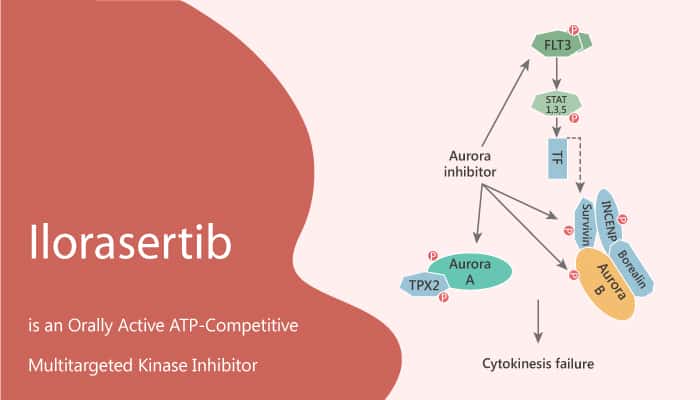Aurora kinases are key regulators of mitosis that overexpress in many cancer types. Ilorasertib (ABT-348) is a potent inhibitor of all three Aurora kinases, although it has greater activity versus Aurora B and C than Aurora-A. In addition, Ilorasertib also inhibits VEGFRs and PDGFRs, and the Src families of tyrosine kinases in the low nanomolar range. Ilorasertib is an ATP-mimetic kinase inhibitor that was selected for clinical development on the basis of its dual-inhibition properties of Aurora and vascular endothelial growth factor receptor (VEGFR) kinase signaling pathways.

In enzyme assays to determine kinase inhibitory activity, Ilorasertib shows in vitro potency against a panel of cancer-related kinases with greater potency for inhibiting binding and cellular autophosphorylation of Aurora B and C.
As with inhibition of Aurora kinase activity, inhibition of VEGFR/PDGFR kinases in biochemical assays correlated with inhibition of cellular autophosphorylation of targeted kinases for VEGFR2, FLT-3, CSF-1R, c-KIT, and PDGFR-α and PDGFR-β.
Ilorasertib alone or in combination with Azacitidine demonstrates activity in preclinical models in various hematological malignancies. These indicate that pan-Aurora kinase and multiple kinase inhibition may have preferential antileukemic activity. Moreover, Ilorasertib also shows activity in acute myeloid leukemia. Ilorasertib exhibits acceptable safety and pharmacokinetics, displays evidence of dual Aurora kinase and VEGF receptor kinase inhibition. In particular, Ilorasertib targets multiple pathways of tumor progression. As a result, it may have the potential to overcome the limitations of the more selective kinase inhibitors.
In summary, Ilorasertib demonstrates an acceptable pharmacokinetic and tolerability profile as monotherapy.